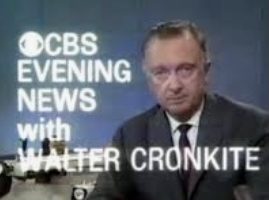 My family was one of the last in our community to get a television. Although my Dad was quite a “news wonk”, his current events information came from newspapers. and radio. Even after we got a t.v. I don’t recall our family watching the news very much.
My family was one of the last in our community to get a television. Although my Dad was quite a “news wonk”, his current events information came from newspapers. and radio. Even after we got a t.v. I don’t recall our family watching the news very much.
The legendary names of the broadcasting greats from my childhood are not as familiar to me as they might be for most. Except for Walter Cronkite. Considered the “most trusted man in America” during the 1960’s and ’70’s, his image was that of an unbiased reporter just communicating “the facts”. He prided himself on “objective reporting”. but Cronkite did not just report “the facts”, he came to reasoned conclusions based on the facts. When he reported on the Vietnam conflict, he predicted it would not end in a victory, but in a stalemate. His influence was so pervasive that it launched the myth that it was the reason LBJ decided not to run for re-election. And Cronkite’s analysis of the Watergate scandal perhaps pushed the public opinion that forced Nixon to resign. His signed off his broadcasts with the signature phrase: “…..And that’s the way it is”. But in keeping his standards of objective journalism, he omitted this phrase on nights when he ended the newscast with opinion or commentary.
To the listening public Cronkite’s analysis made his reasoned opinions sound like facts. There was somehow something so honest about his demeanor that Americans looked upon him as a family member or friend whom they could trust implicitly.
In the 1990’s I heard a different view of the famous broadcaster, in a morning radio show called “Imus in the Morning”, The host, Don Imus, developed a show with political banter and news. Imus had a stable of comedians, several of which impersonated famous people. One of the personalities that was mimicked was Walter Cronkite, who was portrayed as a wild conservative. It seemed ridiculous to me, because everyone thought of Cronkite as the consummate unbiased reporter. Most people had no idea as to how Cronkite really felt about politics, and that was his appeal.
The Imus comedian who created this nutty conservative broadcaster had no knowledge as to Cronkite’s beliefs. And I was made aware of this when Cronkite was the guest speaker at my niece’s graduation from Brandeis University a few years after he retired. His address could have been given by a supporter of Bernie Sanders: progressive and strongly in the Democratic sphere. But during his career as a broadcaster, his stories were never tainted by these political beliefs.
The business of broadcasting the news has been forever changed. After Cronkite retired there seemed to be a dramatic descent of “objective reporting”. No matter what their political persuasion, Americans tend to be 100% suspicious of any reporter whose facts they do not agree with. Exacerbated by social media, tweets, Fox News and MSNBC, news reporters, even those who might present ” objective reporting”, will never be fully trusted by most Americans. There will never be another Walter Cronkite and “that’s the way it is.”…… no more




